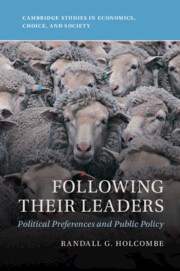Book contents
- Following Their Leaders
- Cambridge Studies in Economics, Choice, and Society
- Following Their Leaders
- Copyright page
- Dedication
- Contents
- Figures
- Tables
- Preface
- 1 Introduction
- 2 Instrumental and Expressive Voting
- 3 Influences over Preference Formation
- 4 Preference Aggregation through Voting
- 5 The Formation of Political Preferences
- 6 Anchor Preferences and Derivative Preferences
- 7 Preferences of Elites and Masses
- 8 Policies That Maximize Political Power
- 9 Patriotism, Propaganda, and the Public Interest
- 10 Implications for Democracy
- References
- Index
4 - Preference Aggregation through Voting
Published online by Cambridge University Press: 16 March 2023
- Following Their Leaders
- Cambridge Studies in Economics, Choice, and Society
- Following Their Leaders
- Copyright page
- Dedication
- Contents
- Figures
- Tables
- Preface
- 1 Introduction
- 2 Instrumental and Expressive Voting
- 3 Influences over Preference Formation
- 4 Preference Aggregation through Voting
- 5 The Formation of Political Preferences
- 6 Anchor Preferences and Derivative Preferences
- 7 Preferences of Elites and Masses
- 8 Policies That Maximize Political Power
- 9 Patriotism, Propaganda, and the Public Interest
- 10 Implications for Democracy
- References
- Index
Summary
This chapter focuses on academic models of collective choice. It discusses voting models and models of social choice to show that the link between instrumental preferences and collective choice outcomes is broken once one recognizes that the political preferences of citizens and voters are expressive, so do not represent the outcomes they most prefer. The models themselves are not wrong, in that they describe the way that expressed preferences are aggregated to make collective decisions. But the interpretation of the models often is mistaken. There is no clear relationship between outcomes of collective decision-making processes and the outcomes that would be preferred by those whose preferences are being aggregated.
Keywords
- Type
- Chapter
- Information
- Following Their LeadersPolitical Preferences and Public Policy, pp. 56 - 71Publisher: Cambridge University PressPrint publication year: 2023

